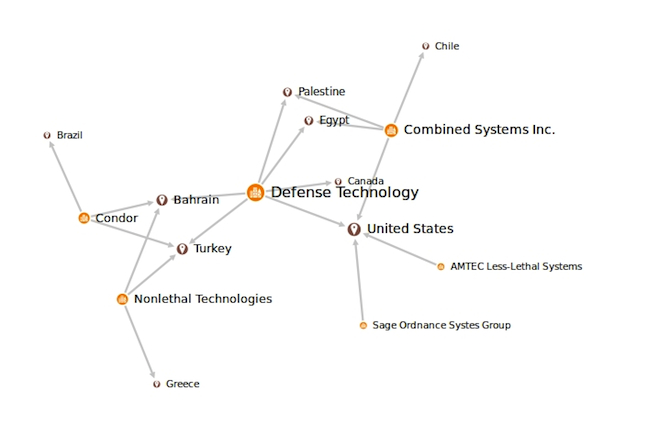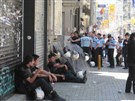As waves of popular uprising have spread across the globe, these disparate movements have all faced overwhelming repression from their own police or military forces. Beyond a general sense of popular power, what unites these popular revolts more than anything else is the tool used to quell mass protests: tear gas. But perhaps what is most striking is that the same handful of tear gas manufacturers ship their gas to repressive regimes around the world.
Using data compiled from several sources, chief among them the Facing Tear Gas campaign, a project of the US-based War Resisters League, I constructed the graph below showing the overlapping network of tear gas manufacturers and the countries they supply. (Full disclosure: I am employed half-time by War Resisters League, as editor of its quarterly magazine.)
Widely regarded as a “non-lethal” technology—despite the counter-factuals we have known for quite some time—the appeal of tear gas to state security is its effectiveness for blanket, indiscriminate crowd control. With the ability to quickly transform a bustling city boulevard overflowing with political energy into a desolate no-man`s land, it is no wonder that those who oppose popular demonstrations of political will turn to tear gas as a means to crush dissent.
As a result of the Arab uprisings, the state security market in the Middle East has ballooned into a multi-billion dollar industry. But the ones profiting most from the stifling of political expression are tear gas manufacturers, most of which are US-based.
In Egypt during late 2011, port workers in Suez took note of this and refused to unload a shipment of tear gas from Pennsylvania-based Combined Systems. Turkey, which came under criticism for excessive use of tear gas during the Diren Gezi movement of Summer 2013, reportedly imported 628 tons of teargas in the period from 2000 to 2012. Muammer Güler, who recently resigned as Interior Minister of Turkey, confirmed that during the Gezi protests Turkish police added tear gas to the water used in the water cannons on armored riot control vehicles.
[A network graph showing tear gas manufacturers and the countries in which their products are used.
Click on the image to view the full interactive graph.]

![[A network graph showing tear gas manufacturers and the countries in which their products are used. See below for an interactive version of this image. Graph by Jay Cassano.]](https://kms.jadaliyya.com/Images/357x383xo/teargasnetworkmap.jpg)















